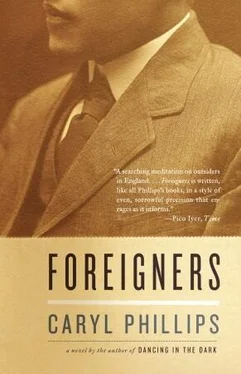The following morning the doctor visited, and having examined Mary Turpin he treated her for bruises to her stomach and groin. After the doctor's departure, Mary told the court that she did not immediately flee the house for Randolph Junior was unwell and she made a decision to wait until her son felt better. Once her son had regained his health she called a taxi and left Randolph Junior behind with a note which read: 'Dear Randolph, I am leaving you with the baby because you can look after it better than I can. I prefer being out at work and having evenings free. I can't be at work and looking after the baby at the same time.' According to Mary, the strange tone of the message can be explained by her claim that her husband had forced her at knifepoint to write the self-incriminating note before allowing her to flee the house. She characterised him as a habitually violent bully who never hesitated to use his fists upon her to settle any arguments that they might have. According to Mary Turpin, he was a man who might be the pride and joy of sports fans in the East Midlands, but behind that quiet, self-effacing exterior was a violent, insecure man who had never learned how to curb his temper or face up to any responsibilities.
When it was Turpin's turn to speak he told the court that he had once hit her, but he insisted that his wife had spent the greater part of their time together goading and baiting him. According to his testimony, she tried to make him lose his temper by accusing him of seeing other women, or by throwing things at him or, on one occasion, actually threatening him with a knife. Turpin steadfastly denied having had any affairs, although the evidence was overwhelming that he was a habitual offender, and eventually Mary felt that she had no choice but to produce a letter that was allegedly written by a girl named Pam. 'My own darling Randy,' it began, 'Just remember I love you and I will prove how much when I see you again.' It was signed 'Your ever loving Pam.' Turpin's solicitor claimed that although his client knew of the girl, he denied that Turpin had ever seen the letter. He then quickly changed the subject and claimed that it was a known fact that men who made their living hitting people knew how to keep their tempers in control out of the ring. He concluded that all the evidence pointed towards nothing more than a strained relationship between two young and inexperienced people. The magistrates, having examined the evidence, felt inclined to agree with Turpin's solicitor and they dismissed Mary Turpin's case against her husband.
Unfortunately, Turpin's victory in the courtroom was not matched by his performance in the ring. In the middle of this turbulence, in April 1948, having amassed an outstanding record of eighteen wins and one draw since his professional debut two years earlier, Turpin lost on points to a relatively unheralded journeyman named Albert Finch. The newspapers claimed that Turpin fought as though his heart was no longer in boxing, and they speculated that although his older brother Dick was his next logical opponent, it appeared as though there was some kind of agreement that the two would not fight one another. In fact, it was their mother, Beattie, who had drawn a promise from both Dick and Randy that they would never 'go at each other' for money, but his reluctance to fight his brother had not contributed towards Randy's loss of form. Those close to Turpin knew that the real reason behind the fighter's shocking capitulation to Finch was Turpin's frustration at his inability to persuade his wife to accede to his demands. In every other area of his life Turpin was able to insist that people follow his line, but there was something humiliating about his failure to control young Mary Stack, and it caused him anguish to the extent that he was incapable of fully concentrating on his boxing career.
The loss to Finch in April 1948 was followed by an easy victory over an unimpressive opponent, Alby Hollister, and then in September 1948, as the contentions court case with his wife drew to a conclusion, he turned in possibly the worst performance of his boxing career against a modest fighter named Jean Stock. To those who looked on at ringside it was barely conceivable that the man they were watching was the feared 'Leamington Licker'. For the first four rounds Turpin was continually bullied, beaten, and knocked over, and at the end of the fifth round, much to everybody's astonishment, he simply gave up and retired. As in the case of his shocking loss to Albert Finch some five months earlier, career obituaries were prepared for him, but most pressmen acknowledged that it was Turpin's fragile mental state, not his physical prowess, that was the source of the crisis. In fact, in the dressing room, before the bout against Jean Stock had even begun, Randy had told his eldest brother that he did not want to fight and he would not be at all surprised if he lost. Dick tried to pull Randy together, as did Jackie, but they both understood that the humiliation of Mary having been awarded custody of Randy Junior earlier in the day was weighing heavily on their brother's mind. As it transpired, the result of the fight was an even greater embarrassment than the earlier loss to Albert Finch and, for the first time in his life, Turpin decided to take a prolonged break from boxing in an attempt to make sense of his personal life and gain some peace of mind.
After a five-month layoff, Turpin returned to the ring in 1949 determined that he would avenge his two defeats and re-establish himself as a championship-class fighter. He fought and won convincingly eight times in 1949, and then four times in 1950, before being once again matched against Albert Finch, who had recently beaten his older brother, Dick, to become the British middleweight champion. On 17 October, 1950, a dominating victory over Finch established Turpin back at the top of the British rankings. Peter Wilson's report in the Daily Express reflected the general enthusiasm which greeted Turpin's victory. 'Turpin, shaven-headed, his sleek brown body gleaming, his blackgloved fists weaving a deadly pattern of destruction through the smoke-scrawl over the ring, looked like some coppercoloured warrior of the Frontier days. .' Just over four months later, on 27 February, 1951, in an astounding display of menace and brutality, Turpin defeated the Dutchman Luc Van Dam in only forty-eight seconds to become the European middleweight champion. The ferocity of Turpin's assault was such that the Dutchman was unconscious in the ring for a full ten minutes, and the doctor had to attend to him where he lay. Turpin then knocked out his former adversary Jean Stock in five rounds, thus avenging his earlier defeat, and he quickly followed up this victory with three more sensational knockout wins. It was clear that there was nobody left in Britain, or Europe, who was a match for the twenty-two-year-old from Leamington Spa, and talk now began to turn to the possibility of Turpin moving up in weight. However, before this idea could be seriously considered, the London promoter Jack Solomons hit upon the unlikely idea of the young coloured boy tackling the great Sugar Ray Robinson.
After the mayor's victory reception at Leamington Spa Town Hall, Randolph Turpin stayed 'home' for a few days. He and Jackie would often take a purposeful walk down to the Cassino Milk Bar, where crowds of girls would gather around to bask in the aura of the town's most famous son. Although to many, particularly some of the older townsfolk, Randolph Turpin would never be anything other than a coloured bully, his unexpected success meant that he now walked tall in Leamington Spa. The weekend after his victory he fulfilled a promise to a friend, Charlie Hickman, by putting in an appearance at his fairground boxing booth, which was visiting nearby Kenilworth. All three Turpin brothers had, in common with most fighters of the period, earned extra 'illegal' money taking on allcomers at the boxing booths. The heavy drunks provided smaller 'pros' with a chance to hone their evasive skills and practise 'dirty' tactics such as butting or elbowing, or hitting in the 'breadbasket' so that they could keep these bigger men at bay. When Turpin appeared at Charlie Hickman's booth the crowds were astonished, and could scarcely believe their luck that they were being presented with an opportunity to witness an actual world champion who, although he did not box, refereed two bouts. But Turpin's days of levity and indulgence, which revolved almost exclusively around casual encounters with 'birds' and triumphant public appearances, soon came to an end when George Middleton informed his fighter that Robinson had inserted a clause in the contract which guaranteed that, in the unlikely event of a defeat, there would be a rematch within ninety days. Having consulted with Jack Solomons, the two men had decided to honour the clause and had therefore signed to fight a rematch in two months' time in New York City. They could have simply ignored the clause and taken a few easy title defences in Europe before eventually agreeing to meet Robinson, but George Middleton felt duty-bound to honour the contract and the money being offered for the rematch was astronomical by any standards. It was proposed that Turpin would be paid $207,075, while Robinson, despite being the challenger, would receive the larger amount of $248,491.
Читать дальше











![Unknown - [Carly Phillips] The Bachelor (The Chandler Brothe(Bookos.org) (1)](/books/174132/unknown-carly-phillips-the-bachelor-the-chandle-thumb.webp)
